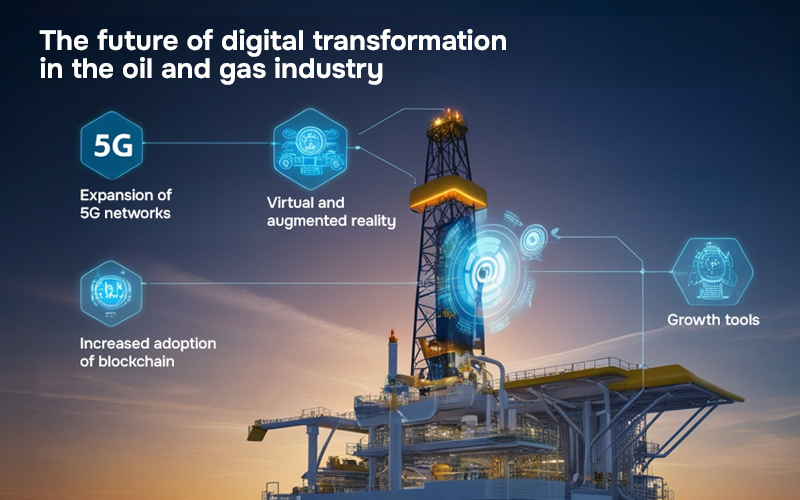How is digital transformation impacting the oil and gas industry? By adopting AI, automation, and IoT, companies are streamlining operations, improving safety, and increasing profits. This article delves into the core benefits, examines the driving technologies, and shares successful case studies in the sector.
The role of digital transformation extends beyond mere automation of manual processes. This shift involves a comprehensive overhaul of business models and operational frameworks, enabling oil and gas companies to embrace smarter, data-driven decision-making processes. This transformation is not only about adopting new technologies but also about evolving business models to stay competitive and resilient in the face of market fluctuations and complex challenges.
Enhancing operational efficiency
Automation in data processing has revolutionized oil and gas operations by eliminating manual processes and accelerating data insights. The use of advanced data analytics automation allows for timely data insights, reducing manual effort and improving resource allocation. Automated data collection from sensors provides real-time monitoring, supporting efficient operations and swift decision-making. By utilizing technologies like robotic process automation, companies can streamline routine tasks, thereby enhancing both safety and operational workflows.
Automated dashboards offer managers real-time visibility into operations, enabling rapid response to metrics and trends. The integration of advanced monitoring technologies bolsters communication reliability, which is crucial for operational efficiency in complex oil and gas environments.
Automation plays a key role in enhancing operational efficiency in the oil and gas industry, allowing companies to streamline processes and minimize manual tasks.
Improving safety standards
AI-powered safety management systems are revolutionizing the oil and gas industry by proactively detecting potential hazards and enhancing safety standards. AI models analyze past incident data to predict risks and improve safety processes, while IoT sensors provide early warnings of hazards like gas leaks, enhancing safety in operations.
These technologies are essential as gas companies adopt advanced safety measures to prevent accidents and create a safer working environment.
Boosting profitability
Predictive maintenance is a game-changer for boosting profitability within the oil and gas industry. By enhancing equipment reliability and reducing operational costs, predictive maintenance allows companies to foresee equipment issues before they cause downtime, leading to significant cost savings. Data analytics and AI play key roles in processing large amounts of data, providing insights that help predict equipment issues, thus reducing downtime. Digital twin technology, which simulates real-world conditions, allows companies like BP to optimize maintenance schedules and prolong asset life.
Centralized enterprise software solutions maximize profitability per barrel and improve cost efficiency by optimizing budgets and resource allocation. These technologies not only streamline business functions but also evolve business models to adapt to the dynamic oil and gas market. Eliminating manual processes and enhancing operational efficiency through digital transformation is vital for boosting profitability in the oil and gas industry.
Key technologies driving digital transformation
Several key technologies are driving the digital transformation in the oil and gas industry, including cloud services, automation, IoT, and analytics. These emerging technologies are integral to improving operational efficiency, enabling faster data processing, and facilitating better decision-making processes. Automation, in particular, plays a critical role in eliminating manual processes and enhancing operational workflows.
The implementation of IoT devices aids in real-time monitoring and predictive maintenance, significantly reducing downtime and improving operational reliability. Technologies such as digital twins, artificial intelligence, and robotics are also making significant strides in improving environmental performance in the oil and gas sector.
By adopting these digital technologies, oil and gas companies can track key metrics, streamline data processes, and derive valuable data insights, ultimately leading to better operational decisions and enhanced efficiency.
Artificial intelligence and machine learning
Artificial intelligence and machine learning are revolutionizing the oil and gas industry by enhancing the accuracy of data analysis and improving operational decisions. Shell, for instance, employs AI models to significantly enhance the accuracy of its drilling operations. By leveraging machine learning algorithms, Shell has been able to enhance the precision of exploration efforts, leading to cost savings in drilling operations.
AI and machine learning are not only improving the accuracy of predictions but also automating inspection processes, thus enhancing overall decision-making. These technologies help in processing aerial data for pipeline anomalies, quickly identifying problems, and automating data collection, which leads to better operational efficiency.
The integration of AI and machine learning in the oil and gas industry is a testament to the transformative power of digital technologies in solving complex challenges and streamlining operations.
Internet of things (IoT)
The Internet of Things (IoT) has become a cornerstone of digital transformation in the oil and gas industry. IoT-enabled smart sensors monitor equipment, detect issues early, and improve maintenance practices. The IoT ecosystem generates immense amounts of useful data that enhance monitoring capabilities, leading to improved proactive maintenance workflows.
Techniques such as sensor data collection automate the process, ensuring regular and proactive maintenance. Smart PIGs, for example, are devices used to monitor and inspect pipelines remotely without interrupting product flow. The incorporation of IoT devices enables real-time monitoring, which is crucial for maintaining the operational efficiency and reliability of oil and gas operations.
Cloud computing and edge computing
Cloud computing plays a crucial role in the digital transformation of the oil and gas industry. Additionally, edge computing is also vital for this transformation. Cloud computing facilitates efficient data storage, processing, and real-time tracking, enabling companies to manage vast amounts of data effectively. By bringing computational resources closer to data sources, edge computing addresses data processing challenges and reduces latency, which is crucial for real-time metrics.
These technologies help in minimizing delays in data transmission, thereby enhancing operational efficiency and decision-making processes. The combination of cloud and edge computing allows oil and gas companies to automate data analytics, derive valuable data insights, and improve overall operational workflows.
By leveraging these digital technologies, companies can streamline their data processes, enhance data accuracy, and achieve better operational outcomes by connecting data.
Overcoming challenges in digital transformation
Despite the numerous benefits, the journey towards digital transformation in the oil and gas industry is fraught with challenges. Around 70% of oil and gas companies that have started digitization projects remain in the pilot phase. They have not advanced further in their initiatives. Unpredictable shifts in commodity prices pose a persistent challenge, affecting digital transformation strategies. To ensure continued profitability amidst market fluctuations, companies need flexible strategies that can adapt rapidly to changing market conditions.
Operational challenges include complex drilling processes, hazardous environments, and communication gaps that complicate digital transformation efforts. However, modernization of operations can lead to increased productivity, cost savings, reduced environmental impacts, and enhanced safety.
By addressing these challenges and adopting digital tools, oil and gas companies can facilitate better predictions and responses to price volatility, ultimately ensuring a successful digital transformation with Whatfix’s digital adoption platform.
Modernizing legacy systems
Modernizing legacy systems in the oil and gas industry presents significant challenges, including technical difficulties and internal resistance from employees. Outdated monitoring systems increase safety risks if threats go unnoticed, highlighting the urgency for upgrades. Legacy solutions like Wi-Fi present limited range, spotty coverage, and costly installations, creating additional hurdles.
The modernization of infrastructure is vital to ensure reliability, efficiency, and compliance with changing industry standards. Digital twins, which are modeled replicas of systems, significantly impact processes by making them faster and safer.
Successful adoption of new software and digital processes requires employee training, upskilling, and consistent performance support. Virtual modeling software integrates teams into one digital workspace, enhancing collaboration during modernization efforts.
Managing costs and investments
Adopting new technologies in the oil and gas sector involves financial challenges that need strategic planning. Oil and gas companies need to recognize the value that new technologies bring in terms of cost-effectiveness and efficiency. Postponing digital investments can lead to significant operational issues, resulting in higher long-term costs.
Implementing Chevron’s predictive maintenance program can reduce maintenance costs by 30% and enhance the efficiency of equipment.
Ensuring compliance and security
Cybersecurity is critical in digital oil and gas operations to protect against hacking and secure operations. Compliance in digital oil and gas operations requires adherence to regulations based on location and work type. Improved collaboration and compliance tracking can arise from addressing IT challenges in oil and gas operations.
Blockchain technology enhances trust, transparency, security, authenticity, and resistance to fraud in the oil and gas sector. Blockchain also creates permanent, verifiable records that facilitate regulatory compliance.
Addressing compliance and security challenges allows oil and gas companies to ensure the success of their digital transformation initiatives.
Future trends in oil and gas digital transformation
The future of digital transformation in the oil and gas industry is marked by several emerging trends that promise to further revolutionize the sector. The expansion of 5G networks, increased adoption of blockchain, and growth of virtual and augmented reality are set to play pivotal roles in shaping the industry’s future. These trends not only enhance operational efficiency but also improve safety standards, reduce environmental impact, and facilitate better decision-making processes.
In the oil and gas industry, digital transformation is no longer an option; it is essential for survival and growth. As companies continue to adopt these emerging technologies, they will be better equipped to handle the complex challenges of the industry, streamline operations, and evolve business models.
Staying ahead of these trends allows oil and gas companies to ensure continued success and resilience in an ever-changing market.
Expansion of 5G networks
5G is set to significantly impact the oil and gas industry by enabling faster and more reliable communication. The introduction of 5G will improve remote operations, enabling better monitoring and management of oil fields.
Private networks driven by 5G technology will enhance integration and visibility across oil and gas operations, leading to streamlined processes and improved operational efficiency. This advancement will also enhance decision-making and reduce downtime within the oil and gas sector.
Increased adoption of blockchain
Blockchain technology is transforming transaction tracking in the oil and gas industry by using decentralized ledgers. It addresses issues such as fragmented spreadsheets and outdated databases in traditional supply chain management, enhancing transparency, security, and efficiency.
Adopting blockchain technology will improve supply chain management, reduce fraud, and enhance regulatory compliance, demonstrating the significant benefits of this emerging technology.
Growth of virtual and augmented reality
Virtual and augmented reality technologies are increasingly used in training programs in the oil and gas industry, allowing workers to practice skills in a safe virtual environment. AR solutions enhance maintenance practices by providing real-time data and guidance through smart glasses, helping technicians perform repairs with increased accuracy and reduced downtime.
Operational simulations utilizing VR allow companies to model complex scenarios, enhancing decision-making and preparedness for real-life challenges encountered in the field. These technologies are set to play an essential role in the future of oil and gas digital transformation.
Digital transformation is reshaping the oil and gas industry by integrating advanced technologies that improve operational efficiency, enhance safety standards, and boost profitability. Key technologies such as AI, IoT, and cloud computing are driving this transformation, enabling companies to streamline operations, make data-driven decisions, and optimize resource allocation. The successful case studies of industry leaders like Chevron, BP, and Shell demonstrate the significant benefits of adopting digital technologies in the oil and gas sector.
As we look to the future, trends such as the expansion of 5G networks, increased adoption of blockchain, and the growth of virtual and augmented reality will continue to revolutionize the industry. By staying ahead of these trends and overcoming the challenges of digital transformation, oil and gas companies can ensure their continued success and resilience in an ever-changing market. The journey towards digital transformation is not without its challenges, but the potential rewards make it an essential endeavor for the industry’s future.
Frequently Asked Questions
What are the key technologies driving digital transformation in the oil and gas industry?
Artificial intelligence, machine learning, Internet of Things (IoT), cloud computing, and edge computing are the key technologies driving digital transformation in the oil and gas industry. These innovations streamline operations, enhance safety, and increase profitability.
How does predictive maintenance boost profitability in the oil and gas industry?
Predictive maintenance boosts profitability in the oil and gas industry by enhancing equipment reliability and reducing operational costs, ultimately leading to significant cost savings and improved operational efficiency.
What are the challenges faced in digital transformation in the oil and gas industry?
Digital transformation in the oil and gas industry faces challenges such as modernizing legacy systems, managing costs, ensuring compliance and security, and overcoming internal resistance to change. These factors significantly impede the efficiency and effectiveness of transformation efforts.
How is blockchain technology beneficial for the oil and gas industry?
Blockchain technology significantly improves the oil and gas industry by providing enhanced transparency, security, and efficiency in supply chain management through decentralized ledgers. This addresses existing challenges such as fragmented spreadsheets and outdated databases.
What future trends are expected to impact the oil and gas industry?
The oil and gas industry is expected to be significantly impacted by the expansion of 5G networks, increased adoption of blockchain technology, and the emergence of virtual and augmented reality, all of which will enhance operational efficiency, safety standards, and decision-making processes. These advancements will drive substantial improvements in the sector’s functionality and effectiveness.





0 Comments